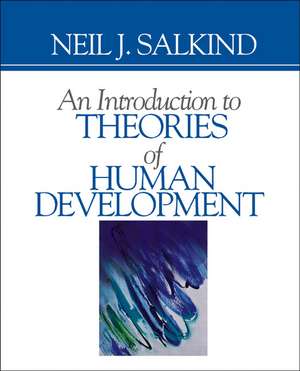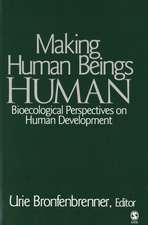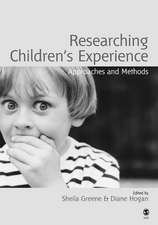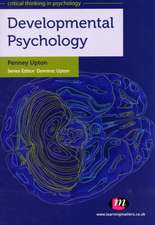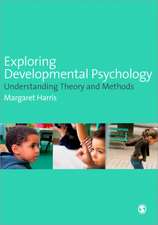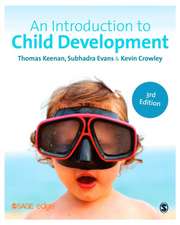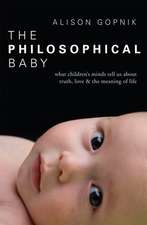An Introduction to Theories of Human Development
Autor Neil J. Salkinden Limba Engleză Paperback – 8 mar 2004
Preț: 1084.09 lei
Preț vechi: 1485.06 lei
-27% Nou
Puncte Express: 1626
Preț estimativ în valută:
207.47€ • 215.80$ • 171.28£
207.47€ • 215.80$ • 171.28£
Carte tipărită la comandă
Livrare economică 14-28 aprilie
Preluare comenzi: 021 569.72.76
Specificații
ISBN-13: 9780761926399
ISBN-10: 0761926399
Pagini: 368
Dimensiuni: 187 x 232 x 19 mm
Greutate: 0.62 kg
Ediția:New.
Editura: SAGE Publications
Colecția Sage Publications, Inc
Locul publicării:Thousand Oaks, United States
ISBN-10: 0761926399
Pagini: 368
Dimensiuni: 187 x 232 x 19 mm
Greutate: 0.62 kg
Ediția:New.
Editura: SAGE Publications
Colecția Sage Publications, Inc
Locul publicării:Thousand Oaks, United States
Recenzii
“The book is well written and the theorists and their respective work are well-presented and clearly explained. . . . As a text dealing with the historical overview of major theorists and their work in human development over the last century or so, it is extremely strong and could be widely used in a variety of both undergraduate and graduate courses.”
“In general, I found the websites and references listed at the end of each chapter to be very interesting and useful for taking students beyond what is in the text.”
“A fine choice for a classic theories course, and I believe that the level of presentation would be appropriate for advanced undergraduate or graduate students. . . . The up-to-date web sites at the end of each section are a definite plus. The choice of sites is excellent.”
Overall, An Introduction to Theories of Human Development is an excellent introduction for students who are already grounded – or who at the very least intend to become grounded – in traditional ways of ‘doing science.’ It is clear and well structured, reader-friendly (including summary boxes, illustrations, highlights of important points, and employs jargon only where it is necessary – without oversimplifying or dumbing down), orients to up-to-date additional readings and web sites, and, not irrelevant for students, it is not too expensive
Cuprins
PART ONE. AN INTRODUCTION & IMPORTANT IDEAS
1. An Introduction to the Study of Human Development
2. Trends & Issues in Human Development
PART TWO. THE MATURATIONAL & BIOLOGICAL APPROACHES
Arnold Gesell and the Maturational Model
4. The Importance of Biology: Sociobiology & Ethology
PART THREE. THE PSYCHODYNAMIC APPROACH
5. Sigmund Freud's Psychosexual Theory
6. Erik Erikson's Focus on Psychosocial Development
PART FOUR. THE BEHAVIORAL PERSPECTIVE
7. The Behavioral Models of Development
8. Social Learning Theory
PART FIVE. THE COGNITIVE DEVELOPMENTAL VIEW
9. Jean Piaget's Cognitive Model
10. Lev Vygotsky's Sociocultural Theory of Development
PART SIX. A COMPARATIVE ANALYSIS
11. Comparing Theories of Human Development
1. An Introduction to the Study of Human Development
2. Trends & Issues in Human Development
PART TWO. THE MATURATIONAL & BIOLOGICAL APPROACHES
Arnold Gesell and the Maturational Model
4. The Importance of Biology: Sociobiology & Ethology
PART THREE. THE PSYCHODYNAMIC APPROACH
5. Sigmund Freud's Psychosexual Theory
6. Erik Erikson's Focus on Psychosocial Development
PART FOUR. THE BEHAVIORAL PERSPECTIVE
7. The Behavioral Models of Development
8. Social Learning Theory
PART FIVE. THE COGNITIVE DEVELOPMENTAL VIEW
9. Jean Piaget's Cognitive Model
10. Lev Vygotsky's Sociocultural Theory of Development
PART SIX. A COMPARATIVE ANALYSIS
11. Comparing Theories of Human Development
Notă biografică
Descriere
An Introduction to Theories of Human Development provides a comprehensive view of the primary theoretical models of human development including those from the biological, psychoanalytic, behavioral, and cognitive developmental perspectives. Along with a brief discussion of a historical background for each of these approaches, this book examines the application of these theories to various aspects of human development, such as the effectiveness of early intervention, individual differences, adolescence, and sociobiology.
